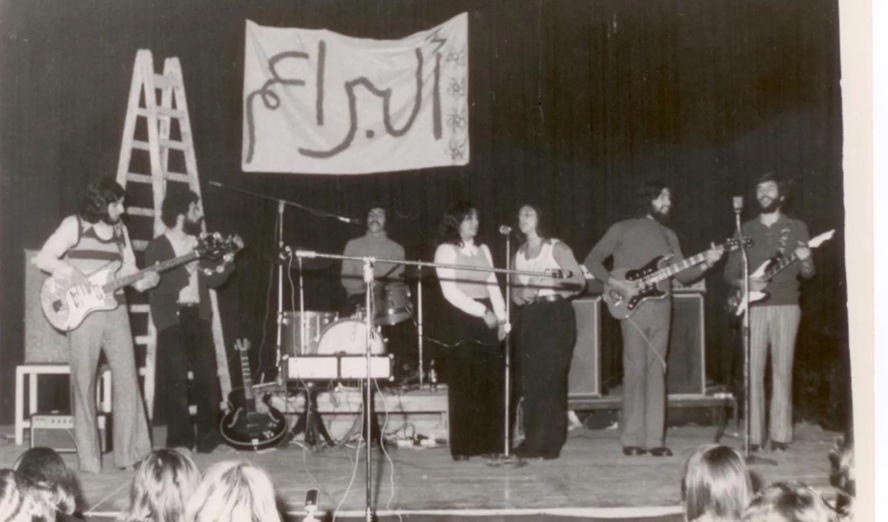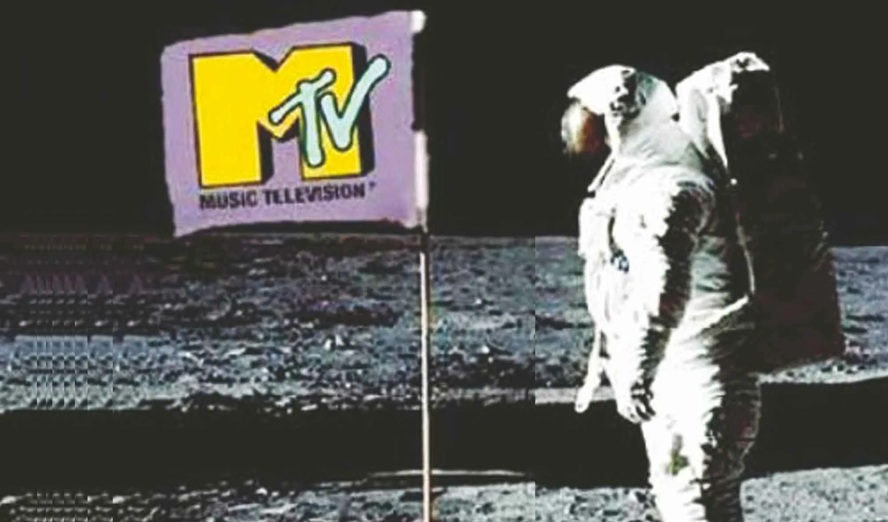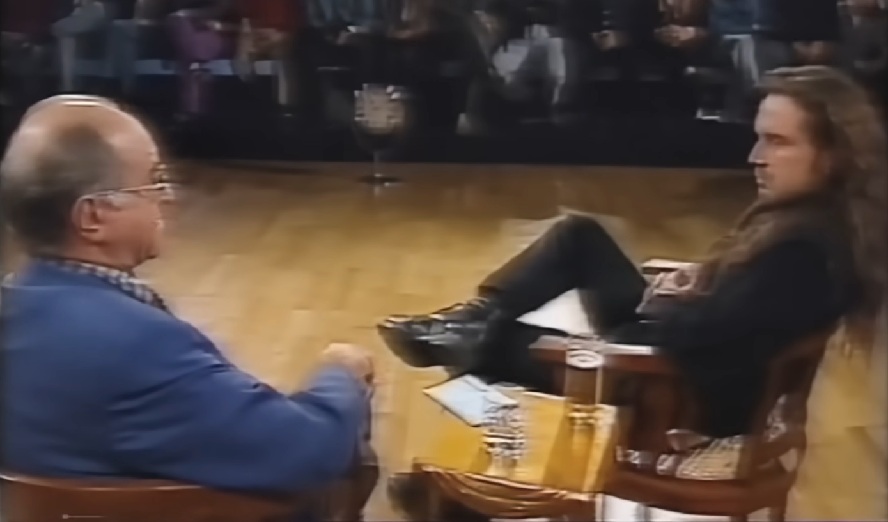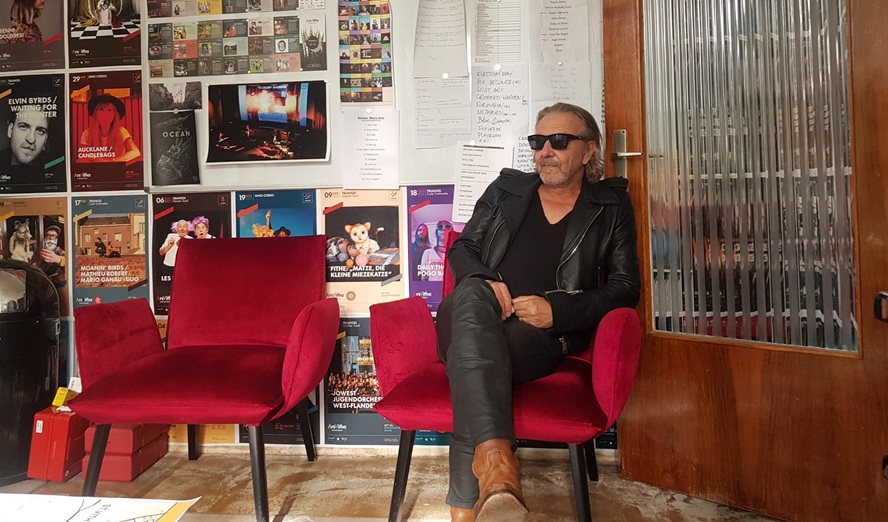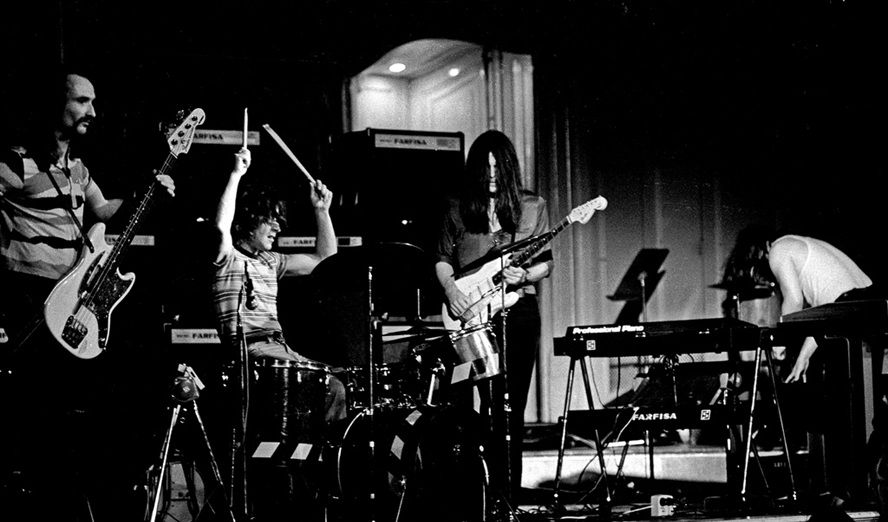In early June, American-Japanese musician Terre Thaemlitz had been invited for a performance to the opening of the exhibition »The Death Of The Audience« in the Viennese Secession.
For about two hours, he played an acoustic piano piece. Dressed in a shiny gala-like dress, Thaemlitz just sat there, pouring drops of piano sounds into the gallery and creating an environment that oscillated between fragile, restrained and eruptive moments. Single chords delayed themselves to seemingly infinity. The projector next to the audience displayed various designs, text excerpts and statistics from »Soulnessless«, his big follow-up project to »Love Bomb«.
In the interview, Terre Thaemlitz talks about »Soulnessless«, his ideas about soul music, its technical aspects and its (dis-)connections towards the Western music industry.
For him, musicians and producers seem to be confronted with drastic changes in their working conditions due to an »easy access«-mentality in the MP3-era. He also focuses on current socio-political mechanisms which force society in general and queer positions in particular back to conservative concepts of cohabitation like families and clans.
»Soulnessless«
My next album »Meditations On Wage Labour And The Death Of The Album« is part of a bigger project called »Soulnessless«. It was conceived after »Love Bomb« and is my next big electro-acoustic instalment. While »Love Bomb« was deconstructing ideas of love in relation to the audio, this project takes a look at soul music, the idea of spirituality, religion and soul in the way of how the music market perpetuates them. It’s an epic scale project, 35 hours of media, with big texts and everything. The »Meditations«-album, which a.o. focuses on money relationships between the artist and the music market, is a DVD data ROM, a 4GB single track, the biggest FAT32-compliant that you can make. It’s a 30hours‘ performance of a piano piece that I had recorded at York University (GB).
Unlike my previous piano pieces, this one is only acoustic, not prepared, not looped, nothing. This was the acoustic aspect. The digital part was figuring out the file processing of how to compress these sessions of a volume of 70GB down to 4GB/320kbps, which allows only approximately 29 hours of recording.
The basic idea about »Meditations« was that it’s the world’s first full length MP3-album. In the age of vinyl, the average length was about 36 minutes, with CDs it became 80 minutes. So we as producers were then required to produce albums that were almost double length to make it a standard album. At the same time, advances in royalties rather fell than increased: Getting paid less for more. In the MP3-era, with its »pay-per-track-download«, where you only get a fraction of that percentage of the album-royalties, it’s even less. But we have to keep on producing. So I produced an album with a single track that is only limited by the FAT32-requirements, it simply becomes too big to download.
In June 2008 we did the recordings at the York University as part of my computer music residency there for their series called »New Aesthetics in Computer Music«. They basically do research about people like myself who are completely out of any institutional affiliations, asking us how the hell we survive, giving access to the studio etc. They had very good equipment and this beautiful, big piano. I knew that I wanted to have access to that Fazioli piano. They have a very dry auditorium there, no reverbs, so the only sounds you get are those of the piano. The audio quality of the MP3 is surprisingly nice, we recorded at 96KHz/24Bit, these were the most qualitative files that we could make. The piece was recorded in sessions of around six hours each. We took the masters and processed them in one file. I’m not a trained pianist player at all. So it’s a strange piece that I play in a strange way. The trained pianists at the York university tried to play my piece. They couldn’t, but for me it was very simple [laughs]. I’m using only the left hand. It’s a metaphor for the left in the contemplation with labour. So it’s about to meditate on materialistic practices, rather than to meditate on spirituality etc., to spend that time reflecting on something concrete.
»Meditations« is not intended as a spiritual piece. The music can be relaxing, it’s intended to be listenable. I also had to think of what I could play for 30 hours. If it would be too active, it could become annoying or fall apart, so it’s a very slow, repetitive piece. For me, when I consume music, even if it’s produced by this spiritual perspective, I listen to it through a materialistic, historical and Marxist perspective that is not interested in spirituality. It’s the same with my music: It’s influenced by the cultural context that I’m in or styles that I like, but I arrive at these sounds from a process that is about materialistic reflection.
The other disc of »Soulnessless« is a video DVD that contains completely different tracks, which makes the whole release enormously long. Which is going with the idea of the scale. None of these discs are playable in your stereo. You have to have a DVD-player or a computer to access the files. It becomes a digital album, where the format precludes that you are using it on the stereo. As a reaction to the quick download stuff, these pieces are a big accumulation of information that practically become unmanageable under these demands. It’s so to speak the offline version of the problems I had with online retailers like iTunes selling my albums out of contract for years. And when asking to put them offline, they never responded to my emails. So I tried to upgrade the current audio format MP3 to a more resisting stance. I’m against an »easy access«.
»Meditations« puts in question the relationship between a convenient format and still to survive economically. Music is not simply an object of commodity. With electronic music it has been the case more or less for all the time that live concerts are the only possibility for to raise money. You have a record that basically is a promotional device for booking agents. Maybe you get some advances for the album, but fact is: It’s pretty rare getting royalties beyond the advances. In February 2009 I had released »Dead Stock Archive« on Comatonse, a collection that contains all my music I have released so far. The whole package is about 250 Euro. But if you think that it contains more than 60 hours of music and 771 titles, it makes around 35 Cents a track, which is quite cheap. This release was a gesture that was driven by the idea resisting that valued music must be economically accessible. We know that accessibility doesn’t feed back the artists. We have to think deeply about mass distribution and stop applying outdated methods on it.
I want to sell »Soulnessless« for a normal price. But to find a record label that could be interested in releasing 35 hours of music for a normal price, and also the distributors who are against a release that can’t be played on a stereo immediately, these are problems that won’t put bread on my table. I assume that in the end I have to manufacture it myself through Comatonse Rec. When I talk with labels, lots of them are interested in my music, but they don’t want the themes that come with it. But for me, I’m interested in the themes, music is kind of arbitrary. It’s also problematic of how to deal with people’s enthusiasm that totally excludes my personal interests.
The way I approached ideas of exclusion, minorities etc. in »Soulnessless« was to redirect statements about American Soul music as otherwise it would be too simplistic or too expected. I tried to think of a position for soul music that exists outside that concept of western music industry. With my interest in gender and electronic music, the ultimate collision would be something like convents in the Southern Philippines, where you have nuns using electronic amplification equipment in a third world context with totally different purposes than what could be marketable in the West.
So I went to the Philippines and did interviews with nuns in convents talking to them about the use of microphones, amplifiers and speakers and if they have electronic keyboards or organs. We would like to imagine that by finding this gap is somehow empowering. But we are talking about catholic nuns who of course have a completely ideologically problematic position in the relationship between Catholicism and Philippine culture. The application of what they are doing is totally uninspiring. For me, this was a metaphor for trying to think about a kind of »hardcore« soul music but in a way that is about locating it outside the notion of western soul music and its economic paradigm. »Soulnessless« was intended to produce a critique about soul music that puts in question how we conceive soul music itself, rather than talking about a genre.
Death of The Audience
I was invited to the Secession, because Pierre Bal-Blanc, the curator of the exhibition »Death Of The Audience«, had seen me in an exhibition event for Cornelius Cardew in Fran
ce, I was so to say the legacy connection there. For the Secession I played the same piece like that for the Cardew-exhibition. The Secession seems to be a well established art place that somehow believes in art, whereas for me art needs to be blown away. I guess I was invited because of my antagonistic relationship with music. The audience in the context of this exhibition is not that of an erasure of it but getting away with the idea that audience refers to a passive observation stance. It’s about an integration or stimulation of the activity of the audience.
It’s the same with these pop shows like »American Popstar« or »Deutschland sucht den Superstar«. For me, those shows represent a kind of deconstructive process, it’s like in the Buggles song: »Adventures in modern recording«: The lyrics told about a band not playing music but they are just fooling around and so having adventures in modern recording. Personally, I don’t care. I don’t play instruments, I’m someone who produces music by emulating things that trained people made and deliberately resisting the idea of training. But still producing something that can function in this music market place as normal. By selecting some people who sing some karaoke-like covers and get famous for 15 minutes, demonstrates totally how music industry operates. This is an extreme in the pop market.
Problem is: You are confronted with that totally naked process of society, these shows are totally naked, they don’t try to hide at all how pop music is made, how it’s selected, how it’s plastic. It’s all right there. In that honesty, people rather than to sense that honesty and be disgusted, they slip in and internalize it more and it becomes a total loss of irony. That is exactly the process of Marxist commodity fetishism, the concept of reification. So it’s a quite powerful thing without irony, it becomes harder and harder for people to break through. I think lots of people laugh about it, but to be upset from a cultural perspective seems rare. And it seems totally not surprising. It’s typical that things like these come out of America. And to have them adapted in every other country that complains about America, is also totally typical.
So I think there is this international connection to the notion of Americanisation and people are passive about that as well. Americanisation is not about the United States of America, it’s something different. It has to do with globalisation and the desire still to perceive clanism, nationalism, national identity, and at the same time being open for a kind of internationalism. Maybe the process of Americanisation is getting swept away in this global capitalisation that mixes together everything. Maybe this actual crisis is a chance? No luck. The stock markets are already rebounding, we haven’t learned anything. To put it poetic, it seems like in the »18. Brumaire«: Everything occurs twice in history. First time is tragedy, second time is farce. We are not on any verge of understanding. We are too invested in the type of capitalism worldwide that is reverting back to the ideas of family, clanism, getting away from socialism, getting away from democracy itself. Even in the gay and lesbian communities, you can observe a strong push for families, matrimony and children. There is no more wish to destroy the concept of family or clan. The history of humanity has been the history of clans, concepts like democracy and socialism are historically aberrant. To have this idea of equality and to be totally anti-family, anti-tribe and anti-clan, was a social aberration and I think that we have stepped out of that now. We have this fantasy that capitalism must come with democracy, but we all know and we all can see that capitalism works better without democracy. Capitalism relies on slavery and exploitation. Whereas in former times you had capitalism vs. communism, now you have something like nationalism vs. guerrilla.
State – Spirituality/Failure – Hype
What we really lost is the concept of the state. The state is the ultimate anti-family thing. This leads to ideas of how to deal with gay and lesbian matrimonies, queer families etc. It is about abstract things like love and emotional motifs that can lead to religiosity and a passive, anti-critical perspective. We are lacking the idea of destruction, because we are living in a cultural shift with a total demand for optimism. Even in the critical circles. You always have to focus on the future we want to bring about, it seems a big taboo to complain about the unacceptable things that we have to end. Queer identity, gay pride and »We are queer because we want to be, we come out because we want to be« lose the proposal of how these communities are formed in relation to their exclusion and to form an attempt to react to this isolation from dominant culture. Nobody wants to focus on these negative parts that build up communities, like fear, panic, shame. Not surprisingly, the dominant American anti-terrorist ideology is about fear and panic. This is what makes the country stronger.
This is also what religion is about: Fear of what’s going to happen when you die. Ultimately, religion is like a cultural placebo. It tells you to be satisfied with what you have today, because your reward will come in the future.
In the west, there are lots of misconceptions about Japanese spirituality. I guess most people lump when they hear words like Shintoism, Zen or Bushido, they think of a meditative, quiet attitude. But Japan is very different from its surrounding cultures like those in Korea, China or Indonesia. They all have very strong religious-based groupings. One can argue that under communism, religion is forbidden in China. But I never met a Chinese person who wasn’t religious or superstitious. For Japanese people, religion is really folkloristic. If you are a Japanese person, most families would be Shinto or Buddhist, so they know what ceremonies to do when people die. If you are Japanese and identity yourself as Buddhist in a very practising way or showing yourself as consciously religious, even if it’s Buddhism, one of the dominant religious practices there, people would totally treat you like you are in a cult or be suspicious. I find that suspicion towards religion in Japan refreshing. There is a strong superstition, many people believe in ghosts, but the religious side is very down-played. Japan is very unique in this compared to other Asian cultures.
There should be no fear in admitting destruction and failure. Because it is ridiculous to think that life only exists when you succeed as most people don’t succeed. We don’t transcend our class, we don’t transcend our living conditions. It’s a good way to keep people under control and them wanting more, to promise more. It’s very hard working in the music industry where everything has to be hype or at least inspiring.
In 2008, as DJ Sprinkles I had released »Midtown 120 Blues« on the label Mule Musiq. It’s my first House album to be formally distributed outside Japan, through Word and Sound. When Mule asked me to produce a new album, I decided to produce a critique of the revival of New York House music, so it became about themes like marketing, and diluting and erasing the contexts of House music such as HIV activism, poverty, gender, unemployment, and all these things that I witnessed in New York in the 80s. For me, one of the ironic subtexts of the album is that it was released on Mule, which is one of these House-revival-labels, although for reviewers it was received at face value as a kind of manifesto from Mule. People usually don’t think about the extra step of my critiquing dynamics between producer and label. Although this was also a part of many of my Mille Plateaux-releases, such as the bonus Clicks’n’Cuts-dance track »chng yourlove« on »Lovebomb«, which was a message to the label in protest of their shift away from abstract electroacoustic audio toward their Deleuzian marketing machine strategy. So the Mule album was like every other, with the typi
cal label antagonisms about the direction of the music, graphic design control, limiting or editing my texts, my having to insist upon including Japanese track titles and text despite Mule being a Japanese label.
There is always such unbelievable resistance to content as a stumbling block to marketability. But once the album’s out and if the press accepts it, the labels are suddenly happy about the things they didn’t want. These sorts of antagonisms are common to most all album production – where the contract between producer and label involves a degree of censorship, or final control in contract terms – yet people and also many producers carry on the idea that music is a »personal statement« or »personal expression«.
For me, every product – every album by every producer – is about the unavoidable violence of concession under capitalism. I can say all of my albums turn out miles away from my personal intentions, despite their appearing so deliberate. But discussing this matter-of-factly remains taboo to the disheartened listeners, distributors, labels, other producers, etc. It totally fucks up business relationships, destroys sales potential, and eliminates offers for employment. Despite economic suicide, I consider it a necessary strategy for disrupting marketing processes. But not so ironically, the greatest act of concession in all my projects is the way these attempts at resistance are so easily re-assimilated back into a grotesque, quasi-marketable concept of an »artistic ego«.








